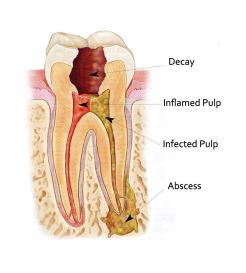Frequently Asked Questions
Endodontists are dentists with advanced education and training to specialize in maintaining your natural teeth through root canal therapy and surgery.
In addition to four years of dental school, Dr. McRay and Dr. Cohen received two more years of advanced education in endodontics. They studied the latest proven techniques and procedures in great depth, and they now focus their dental practices solely on endodontic care.
 When you look at your tooth in the mirror, the portion you can see is called the crown. The rest of the tooth, hidden beneath your gums, is called the root. In the center of the root is a root canal that contains a pulp made up of soft tissue, blood vessels and nerves.
When you look at your tooth in the mirror, the portion you can see is called the crown. The rest of the tooth, hidden beneath your gums, is called the root. In the center of the root is a root canal that contains a pulp made up of soft tissue, blood vessels and nerves.
Tooth decay, fracture, or gum disease can introduce damaging bacteria into the pulp (the soft tissue containing nerves and blood vessels in the middle of the tooth). This bacterial infection can lead to swelling, sensitivity, and pain.
Root canal therapy is done to remove the infected pulp and prevent further infection, inflammation, and pain.
Your comfort is of the utmost importance to us. We will take every measure to ensure that your procedure is relaxed and comfortable. Today, with modern technology and better anesthetics, most patients report a pain-free experience and can expect very little post-treatment discomfort.
Oral conscious sedation and nitrous oxide conscious sedation are available to reduce any anxiety you may have about the procedure. Please contact our office before your appointment to request or discuss conscious sedation.
Yes. If you have any concerns about the safety of root canal treatment, please call our office before your appointment or explore this comprehensive review of root canal safety from the American Association of Endodontics: http://www.aae.org/rootcanalsafety/.
No. While x-rays will be necessary during your endodontic treatment, we use an advanced non-film computerized system called digital radiography that produces radiation levels up to 90 percent lower than those of already low-dose conventional dental x-ray machinery. These digital images can be optimized, archived, printed and sent to other providers via e-mail or CD-ROM.
The doctor will use local anesthetic to numb the affected area and prevent discomfort. A dental dam will be placed around the tooth to isolate it, keeping the tooth clean and dry during treatment. The doctor will make a small hole in the biting surface of your tooth to access your root canal. After removing the bacteria and infected tissue, the empty root canal will be filled with a permanent filling material. The hole in the biting surface of your tooth will be sealed with temporary or permanent filling material, as appropriate.
When your root canal therapy has been completed, a record of your treatment will be sent to your general dentist, who will contact you to place the final restoration for the crown of your tooth. It is important that you return to your general dentist as soon as possible to protect your tooth from fracture or re-infection.
It is rare for endodontic patients to experience complications after routine endodontic treatment or microsurgery. If a problem does occur, however, we are available at all times to respond.
Root canal or endodontic therapy has a very high degree of success, above 95%. Since this is the human body, there are, of course, no guarantees. We will discuss with you the chances of success before any endodontic procedure to help you make an informed decision.
The doctor will examine your tooth 6 – 12 months after treatment to ensure that it is healing properly. We will contact you at the appropriate time for a re-evaluation, which is a complimentary service that should take only a few minutes.
